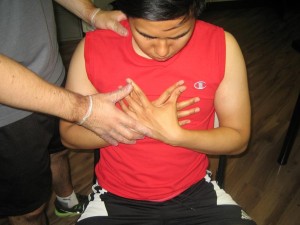Heart palpitations are sensations experienced when the heartbeat does not feel normal. In most cases, it feels like the heart skipped a beat or had an additional beat. Some describe it as a fluttering or pounding in the chest. It can also be an abrupt increase in the heart rate and can be felt in the neck.
The palpitations can occur even if the individual is not engaging in any stressful or strenuous activity. The feeling can be quite disturbing especially if the individual has not experienced them before. If you want to learn measures to manage the palpitations, it is best to enroll in a course on first aid today in your area.
Connection between heart palpitations and eating

Some individuals have heart palpitations after eating and there are various reasons why this occurs. Initially, the individual might be sensitive to caffeine which is present in various beverages including tea, coffee, energy drinks and soda. Even chocolate contains caffeine.
Alcohol might also have a role. In a study conducted, there is a link discovered between heart palpitations and the consumption of alcohol with atrial fibrillation. On the other hand, the individual might only be sensitive or allergic to a particular food. Take note that heartburn due to eating rich or spicy foods can also lead to heart palpitations.
Certain dietary supplements that are taken with meals can cause heart palpitations which include ephedra, bitter orange, valerian, ginseng and hawthorn.
The palpitations might also be caused by the mere act of swallowing. In some individuals, standing up after being seated can trigger the palpitations or triggered by emotions. In addition, low blood sugar, low potassium and even dehydration are also factors why some experience heart palpitations.
Other possible causes of heart palpitations
Pregnant women or those who are exercising are prone to heart palpitations. Even intense emotions such as panic and fear can trigger them.
Prohibited drugs such as cocaine and amphetamines can also trigger palpitations as well as the nicotine present in cigarettes.
There are also certain medications that can cause palpitations. These include over-the-counter cold medications and decongestants. Medications used in treating heart diseases, asthma and high blood pressure, thyroid hormones, diet pills and some antibiotics can cause heart palpitations.
When to consult a doctor?
If the individual initially experiences heart palpitations, a doctor should be consulted. Remember that it might indicate a serious health issue especially if accompanied by the following:
- Profuse sweating
- Difficulty breathing
- Confusion
- Chest pain
- Lightheadedness or dizziness
- Tightness or pressure in the chest, neck, jaw, arms or upper back
The doctor will diagnose the condition by conducting a physical examination. In case a heart issue is suspected, the following diagnostic tests are carried out:
- Urine tests
- Blood tests
- Stress test
- Echocardiogram
- Electrocardiogram
The treatment that will be started will depend on the diagnosis from the tests performed.
